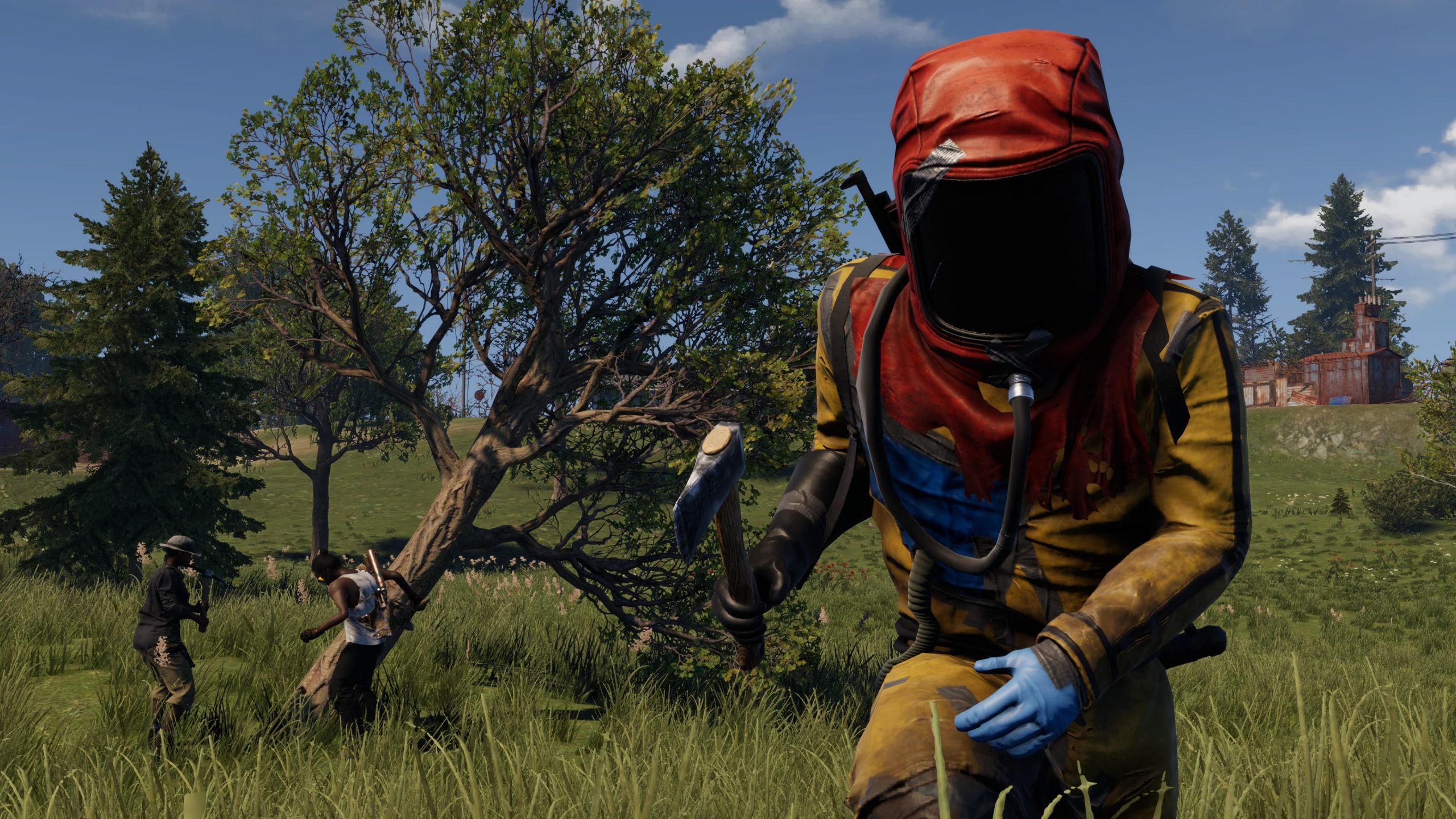Rust Workbench Tax - What Players Need To Know
There's a big conversation happening right now among folks who play Rust, and it's all about a rather significant adjustment to how things work with those crafting stations you use to build up your gear. This change brings a fresh way to think about how you play the game, as you'll now need to consider a new kind of payment, using scrap, whenever you want to get your hands on more advanced items. It's a shift that touches everyone, from those just starting out to the most seasoned players.
This particular update, which is already getting put through its paces on a testing server, puts a new kind of charge on using workbenches. Basically, when you go to research new things or make certain items, you'll find an extra scrap cost added to the process. This bit of news has sparked quite a bit of chatter across the biggest online gathering spots for Rust players, where people share thoughts, show off what they've built, and catch up on what's happening in the game. You know, it's pretty much the main spot for all things Rust.
The core idea here is to add a bit more thought to how you spend your valuable scrap. This new system, you see, changes the price tag on items you want to learn about through the tech path, which is where you get all your cool new inventions. It's a topic that's got everyone talking, from those who prefer playing on their own or with just one friend, to the larger groups who roam the land. So, we're going to take a closer look at what this all means for you, and what you might expect when these changes go live.
Table of Contents
- What's the Latest on the Rust Workbench Tax?
- How Does the Rust Workbench Tax Affect Different Players?
- Breaking Down the Rust Workbench Tax Percentages
- What Other Updates Came with the Rust Workbench Tax?
- Can Server Owners Tweak the Rust Workbench Tax?
What's the Latest on the Rust Workbench Tax?
A pretty big update is on its way to Rust, and it includes something called a workbench tax. This is, you know, a fee you pay in scrap when you use those workbenches to get access to better gear. It’s a way the game is adding a bit more thought to how you move forward and what you decide to spend your scrap on. The idea is that every item you research or craft that relies on a workbench now has a little extra price tag attached to it. This isn't just about the usual materials; it's an extra layer, like a service charge for using the advanced crafting spots.
The New Scrap Cost for Progress with the Rust Workbench Tax
So, the heart of this change is about scrap, that valuable resource you collect all over the map. When you want to research a new item on the tech path, which is basically the tree of inventions you can learn, there's now an extra bit of scrap you have to give up. This extra payment depends on which level of workbench you're using. For example, if you're at a basic crafting station, the fee might be quite small, or even nothing at all. But as you move up to more advanced workbenches, the amount of scrap you need to part with goes up, too. It's almost like a tiered system for how much you pay to learn something new or craft something special. This makes you think a little harder about whether that new item is really worth the extra cost in scrap, especially if you're trying to save up for something else. It's, in a way, a new challenge for everyone.
How Does the Rust Workbench Tax Affect Different Players?
This new system has sparked quite a bit of conversation, particularly about how it might hit different kinds of players. Some folks are saying that this scrap fee will mostly make things harder for those who play by themselves or with just one friend. They feel that getting enough scrap for their own needs is already a bit of a struggle, and adding this extra cost could slow them down quite a lot. It’s a rather common concern among players who enjoy a more solitary experience in the game. They worry about how quickly they can move up the tech path and get better items when every step costs more precious scrap.
Solo, Duo, and Group Play and the Rust Workbench Tax
On the flip side, people who play in bigger groups, like clans, might find this change less of a problem. Their argument is that these larger groups can, you know, just take over a monument for a little while and gather all the scrap they need without too much trouble. They have more people to collect resources, protect their finds, and share the load. So, for them, an extra scrap cost for workbench use might just be a minor bump in the road, something they can easily overcome by working together. This difference in how the fee impacts various group sizes has led to some interesting discussions within the player community. It really highlights how group size can change your experience in the game. Basically, what might be a big hurdle for one person is just a small step for a larger team. It’s a point that often comes up when talking about fairness in a multiplayer game like this.
Some players, actually, have voiced that Rust is a game that already takes up a lot of hours. They wonder why some folks insist on doing everything by themselves only to then express their frustration about it online. The advice often given is to find a couple of like-minded buddies to play with. It's not that hard, they say, to team up. Or, just stop complaining about people playing in groups in an online video game. This viewpoint suggests that the game is meant to be played with others, and that some of the difficulties, like managing resources with this new workbench tax, are simply part of the experience when you go it alone. It’s a perspective that really gets to the core of how some players approach the game’s social elements.
Breaking Down the Rust Workbench Tax Percentages
Let's get into the specifics of how much this workbench tax actually is. The amount you pay back changes quite a bit, going from a smaller portion, say twenty parts out of a hundred, all the way up to a much bigger chunk, like sixty parts out of a hundred, of the research cost. This variation depends entirely on the level of the workbench you're using. So, a higher-level workbench means a higher percentage of the research cost gets added as this extra fee. It’s pretty straightforward in how it works, but it does mean you need to pay attention to which workbench you're at when you're planning your research.
For those who are interested in the default settings for this new scrap payment system, here’s a simple breakdown. When you use a Tier 1 workbench, there’s actually no extra fee at all; it’s a zero percent tax. Move up to a Tier 2 workbench, and you'll see a ten percent tax added to your research cost. Then, for the most advanced crafting station, the Tier 3 workbench, the tax goes up to twenty percent. These are the starting points, the default amounts that are set for the game. This means that as you progress through the different levels of crafting, the cost of learning new things through the tech path gradually increases, making each step a bit more of a resource commitment. It’s, in some respects, a gentle nudge to make you think about your resource management.
What Other Updates Came with the Rust Workbench Tax?
It's worth noting that the workbench tax isn't the only thing changing in this upcoming update. There are several other additions and adjustments that will affect how you play the game. For example, there's a new seismic sensor, which sounds like it could be quite interesting for base defense or perhaps even finding things. Barricades are also getting some attention in monuments, which could change how those key areas are fought over. And for those moments when you get disconnected, there's an instant server rejoin feature, which is really handy for staying in the action. Plus, the tech path is getting a new combining feature, which might make learning new items a bit more flexible. All these things, you know, come together to make a pretty full update that changes a good bit of the game.
More Game Additions Alongside the Rust Workbench Tax
Beyond the direct impact of the workbench tax, the broader update brings other important tweaks. The seismic sensor, for instance, could open up fresh ways for players to guard their territory or even detect incoming threats. Imagine setting up a perimeter that alerts you to movement before you even see it. The changes to barricades in monuments also suggest a fresh approach to how these important spots are contested. It means that holding onto these areas might involve different strategies than before. The instant server rejoin is, pretty much, a quality-of-life improvement that many players will appreciate, as it reduces the frustration of getting kicked from a server. And the tech path combining feature means you might have more options for how you progress and what items you prioritize learning. These additions, you see, work together with the new scrap cost system to create a somewhat different experience for everyone playing Rust. It's all part of the continuous effort to keep the game feeling fresh and engaging for its players.
Can Server Owners Tweak the Rust Workbench Tax?
For those who run their own Rust servers, there's good news regarding this new workbench tax system. The tax rates are actually something you can change yourself. This means if you don't like the default percentages, you have the ability to set them differently for your own community. The game provides specific settings, like `server.workbench1taxrate`, that allow you to adjust the tax for each workbench level. You can set these values anywhere from zero to one hundred percent, giving server owners a lot of freedom to customize the experience for their players. This feature is pretty useful because it means different servers can offer different levels of challenge or ease when it comes to crafting and research. It's, in a way, a tool for server administrators to fine-tune their game world.
The fact that these tax rates are shown right on the purchase button on the tech path is also a nice touch. Players will be able to see exactly what extra scrap they're paying before they commit to a research item. This transparency helps players make informed choices about their resources. It’s worth noting that this particular scrap fee is exclusive to the tech path system, meaning it doesn't apply to every single thing you craft, just those items you learn through the research tree. This level of control for server owners means that while the core idea of a workbench tax is being added, how it truly impacts a server's players can be quite varied. It means you can, like, really make your server feel unique. This flexibility is a big deal for communities that want to create a specific kind of game environment for their players, whether they want things to be a bit tougher or a little more forgiving.

Rust Tips For Beginners: 9 Strategies To Help Survive The First Few

RUST is finally leaving Early Access – Rad or Shite Gaming

Rust Console Edition Review – Running in the Right Direction